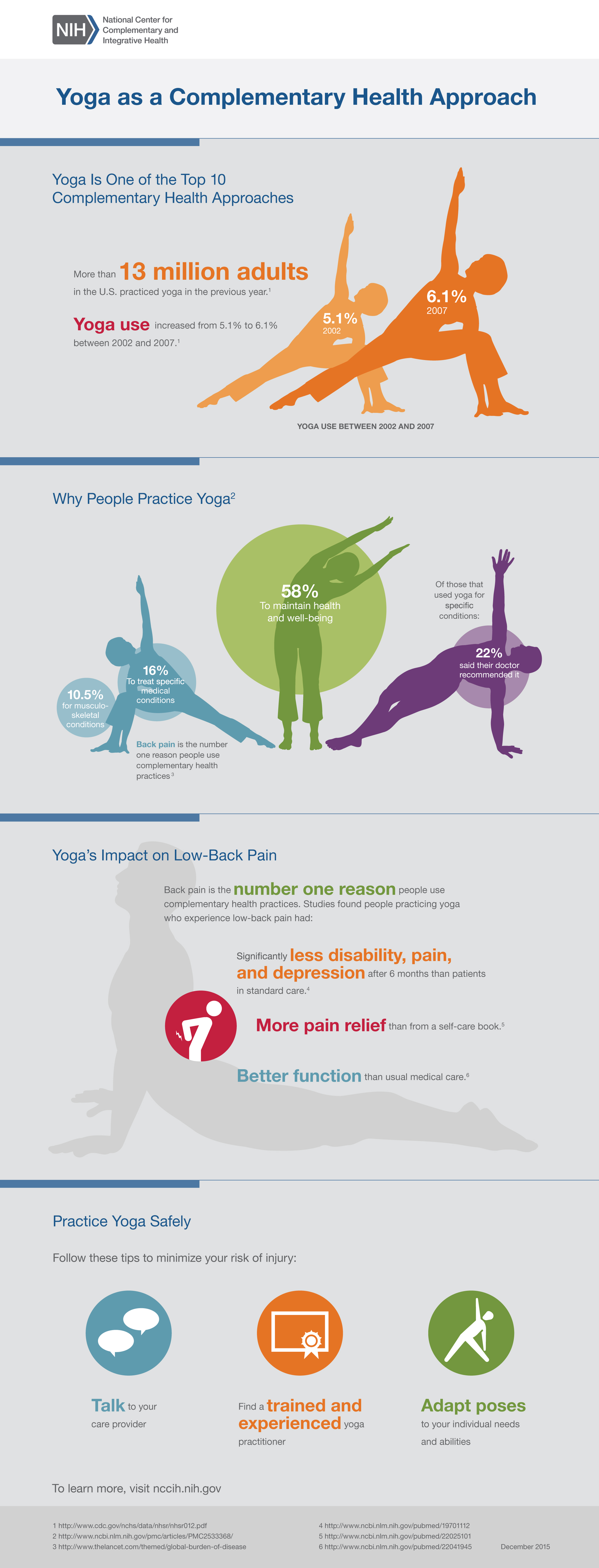Yoga Based Treatment for Veterans
with mTBI and Post-Concussive Headaches
Military Personnel with Mild Traumatic Brain Injury
Project
.jpg?sfvrsn=4d2c41b9_0&MaxWidth=250&MaxHeight=250&ScaleUp=false&Quality=High&Method=ResizeFitToAreaArguments&Signature=5D60DD2360F63E153A2E433FE6FF5EDA33B77F70)
It is well known that military personnel are returning from recent conflicts with notable rates of mild traumatic brain injury (mTBI) and associated persistent post-concussive symptoms (PCS), including headaches and emotional distress. Such symptoms can negatively impact the performance of those on Active Duty, throughout deployment, in and post-combat, as well as following discharge (Veterans). Because of these far-reaching effects, mTBI and associated comorbidities pose a significant challenge and burden to Service Members/Veterans, their families, the Department of Defense (DoD), and the Veterans Health Administration (VHA), and local, regional and national resources including, health care, educational, and vocational systems.
Optimally, an intervention for those with chronic post-concussive headaches (PCH) would show efficacy at reversing post-mTBI adversity, and be able to be utilized with minimal stigma. In addition, the intervention should be highly accessible, low cost, be able to be self-sustaining (e.g., portable) and with minimal side effects.
One potential intervention is yoga, a practice involving physical postures, breath awareness and exercises, and mindfulness meditation.
As such, the goal of this study is to learn more about a yoga-based treatment for Veterans with mTBI and Post-Concussive Headaches.
This project is being funded by the Colorado Traumatic Brain Injury Trust Fund (part of Mindsource Brain Injury Network), Contract IHEA #101374

Our Team

Nazanin Bahraini PhD
Associate Professor
- Physical Medicine and Rehabilitation (SOM)
Email Address:nazanin.bahraini@cuanschutz.edu
Office Hours: Title: Associate Professor Contact: Nazanin.Bahraini@cuanschutz.edu
Dr. Bahraini is an Associate Professor of Physical Medicine and Rehabilitation and Psychiatry at the University of Colorado Anschutz School of Medicine and the Director of Research at the Rocky Mountain Mental Illness Research, Education and Clinical Center (MIRECC) for Suicide Prevention. Her research is focused on designing and evaluating system-level strategies to improve implementation of evidence-based practices in TBI rehabilitation and suicide prevention and understanding the impact of social determinants of health on mental health outcomes and suicide risk. Dr. Bahraini also serves as the Electronic Editor for the Journal of Head Trauma Rehabilitation and an Associate Editor for Psychological Services.
Examples of grant funded projects include: Examining the Effectiveness of an Adaptive Implementation Intervention to Improve Uptake of the VA Suicide Risk Identification Strategy (VA Quality Enhancement Research Initiative); Restoring Efficient Sleep after TBI (CU-REST; Mindsource Brain Injury Network); Developing a Shared Decision-Making Support Tool to Promote Evidence-based Treatment for Veterans with Post-concussive Sleep Conditions (VA Rehabilitation Research & Development).
Areas of Expertise
Suicide prevention, traumatic brain injury and co-morbid psychiatric disorders, novel interventions for mental health.
Education, Licensure & Certifications
Year of Licensure: 2010
Awards
Grants/Funding
- Examining the Effectiveness of an Adaptive Implementation Intervention to Improve Uptake of the VA Suicide Risk Identification Strategy (PI: Bahraini)
- VA Quality Enhancement Research Initiative
- This national quality improvement project will utilize an adaptive strategy to improve implementation of VA Risk ID to fidelity. Using a sequential multiple assignment randomized trial (SMART) design, two evidence-based implementation strategies will be evaluated: 1) Audit and Feedback (A/F); 2) A/F plus External Facilitation (A/F+EF). We will evaluate these strategies across several domains based on the RE-AIM QuEST mixed methods framework. In addition to focusing on implementation outcomes, such as the impact of these strategies on implementation of VA Risk ID to fidelity, and potential barriers to adopting these strategies, we will examine the impact of the clinical innovation (i.e., VA Risk ID) on patient-level outcomes.
https://www.queri.research.va.gov/national_partnered_evaluations/suicide_identification.cfm - Understanding Impact of VHA's New Suicidal Ideation Screening Initiative: Veterans' Perspectives (PI: Dobscha)
- VA Health Services Research & Development
- The primary goal of this study is to characterize Veteran experiences with VHA's new SI screening process and the clinical evaluation that takes place in response to screening results. We will also examine the extent to which screening process variables are associated with mental health treatment utilization over six months.
- Co-Investigator
- Pathways to Partnership - Suicide Prevention for Rural Veterans (PI: Mohatt)
- VA Office of Rural Health
- This Enterprise Wide Collaborative Rural Access Intervention for Rural Veteran Suicide Prevention integrates multiple evidence-based practices and existing VA programs (e.g., suicide risk management in primary care, crisis support, firearm safety, and the Home-Based Mental Health Evaluation [HOME] program) into a comprehensive portfolio of best practices that work synergistically to strengthen VA and community partnerships to empower and mobilize communities around suicide prevention, improve access for rural Veterans, and effectively target known risk and protective factors for suicide.
- Co-Investigator
- Towards Optimizing Behavioral Markers of Suicide Risk (PI: Barnes)
- VA Clinical Services Research & Development
- This study will utilize computerized reaction-time tasks that serve as behavioral markers of suicide risk to evaluate the theory that suicide-related cognitive processes are likely to emerge when people who are at risk of suicide experience distress. If this is the case, inducing a dysphoric mood prior to administering the tasks should optimize their accuracy for identifying Veterans at high risk of attempting suicide in the near future.
- Co-Investigator
Yoga as a Complementary Health Approach
Yoga is a practice involving physical postures, breath awareness and exercises, and mindfulness meditation. Yoga is increasingly being used as a complementary and alternative medicine (CAM) intervention for those experiencing physical and psychological distress.
